One of the biggest components of being a successful real estate investor is identifying the potential value of a property. But you hire an official appraiser to give you an estimate every time you come across a potential deal. The easiest way to quickly estimate the potential market value of a property is by pulling comps from similar nearby properties. Here is a look at top real estate comps software that will help you get the job done.
Best Software For Real Estate Comps In 2025
What are Real Estate Comps?
Comparable sales – or comps – are homes that have recently sold and feature characteristics that are similar to a property you’re interested in purchasing. These characteristics include location, size, condition, and any upgrades such as a pool, outdoor barbecue, and so on. Using these comps, you can determine a rough estimate of the potential market value of a particular property by taking the average from these comps and adjusting for any differences between them and the one you have your eye on. The more properties you can find, the more accurate the estimate will be, but typically anywhere from three to five properties that have sold in the past 3 to 6 months will suffice.
If you have a broker, they can help you pull comps from the MLS. But you can also do it yourself using online listing services and other software. Here is a look at some of the best real estate comps software available online.
Best Free Software to Help You Find Comps
1. Zillow
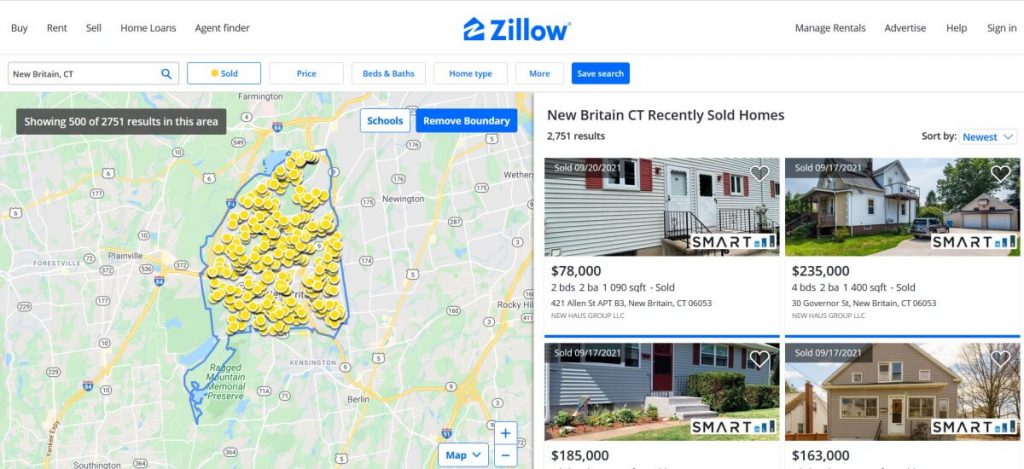
Zillow is one of the most powerful real estate search engines on the market and offers tons of valuable features that can be useful for pulling comps, including a recently sold filter. You can use Zillow to search the city and neighborhood where the property is located and see nearby listings that have sold recently.
You can also view the basic properties of each listing, including the number of bedrooms, bathrooms, and any amenities. This can help you determine a quick estimate based on available sales data. However, keep in mind that Zillow uses public records and therefore the data available may not be as up to date as other sources for real estate comparables.
2. FlipScout
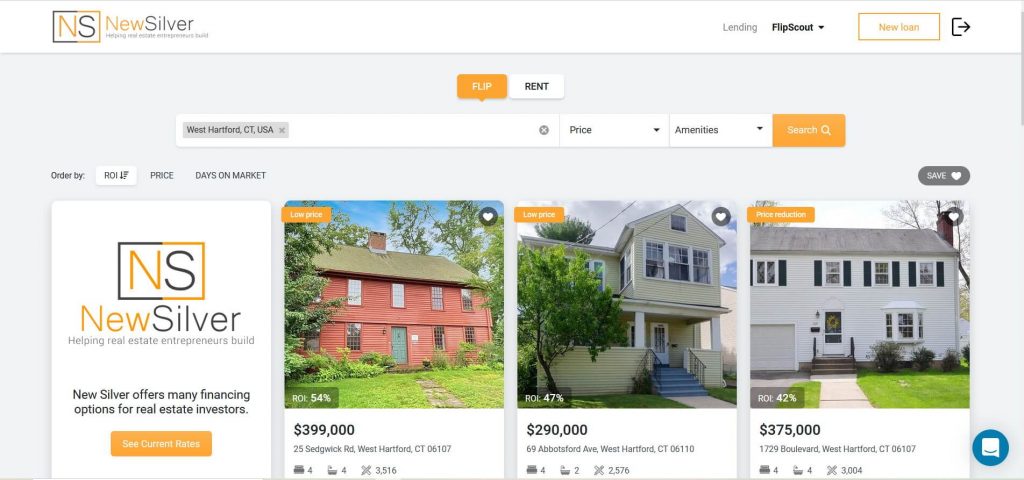
FlipScout by New Silver is a free tool that helps investors find the most profitable deals on the market using data and computer intelligence. This makes it great software for pulling comps because you can not only view available sales data and other important metrics, but you can also estimate rehab costs and potential return on investment.
The software allows you to search by zip code, city, or address and filter results based on price range, home type, and the type of sale (on-market, foreclosure, etc.). Flipscout is great for pulling comps because it was designed with real estate professionals in mind and offers several key features that will help you make smarter decisions about your purchases.
3. ARV Calculator
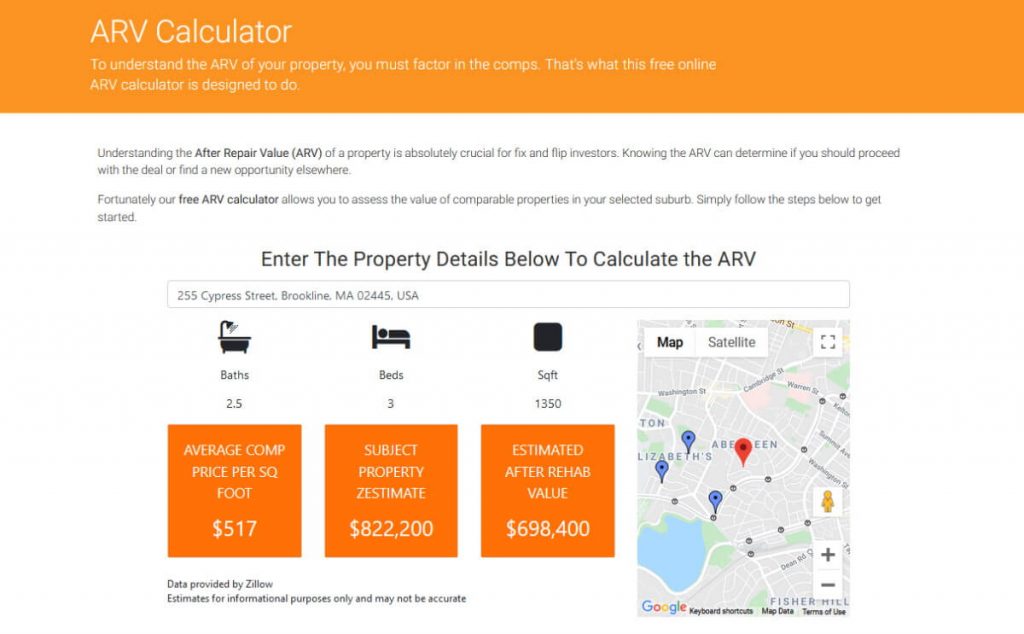
One of the simplest ways to source comps is using an ARV calculator. Given how important the after-repair value is for house flipping, having quick access to comps is an extremely important component of any successful flip. In essence, you need to know how much the house is likely to be worth after the renovations have been completed, in order to estimate how much profit you can make during the deal. Fortunately, New Silver has built a free ARV calculator specifically for this purpose. It allows you to source the prices of recently sold properties, by putting in the property address into the search bar.
4. Eppraisal
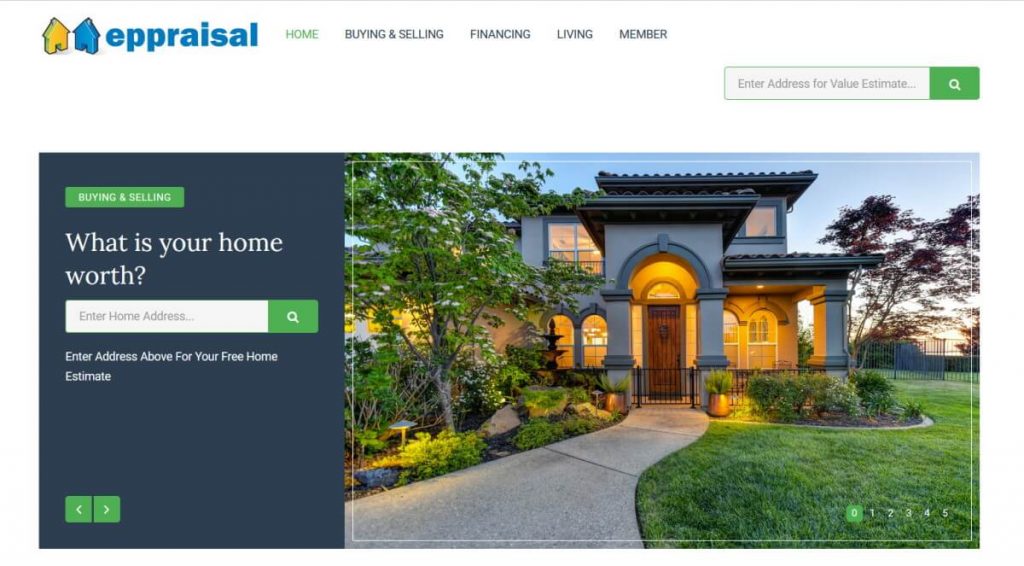
Eppraisal is a free home valuation software that is great for getting a quick estimate of the value of a property and others in the area. In addition to the basic features of a property, eppraisal also offers more advanced demographic data about the area, such as statistics relating to the education, finances, and employment status of the residents. This can help narrow in on a more accurate figure than general sales data aggregators like Zillow. Plus, this real estate investment software allows for a side-by-side comparison with other popular listing sites, so you can see the differences for yourself.
5. Trulia
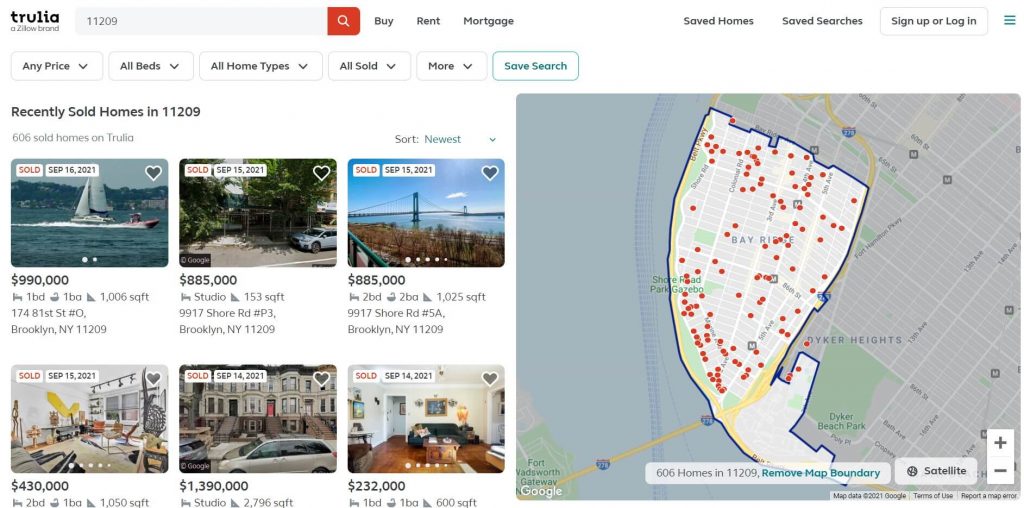
Trulia is another popular listing search engine that can be useful for pulling comps. Trulia is similar to Zillow (and is now owned by the company) but offers a slightly different user experience and features. For instance, it allows users to view a visual breakdown of the costs associated with the property, including mortgage payments, property taxes, home insurance, mortgage insurance, and any other associated fees. It also features a handy crime map that pools data from local law enforcement and news reports to give users a better understanding of the level of safety in the community.
6. Redfin
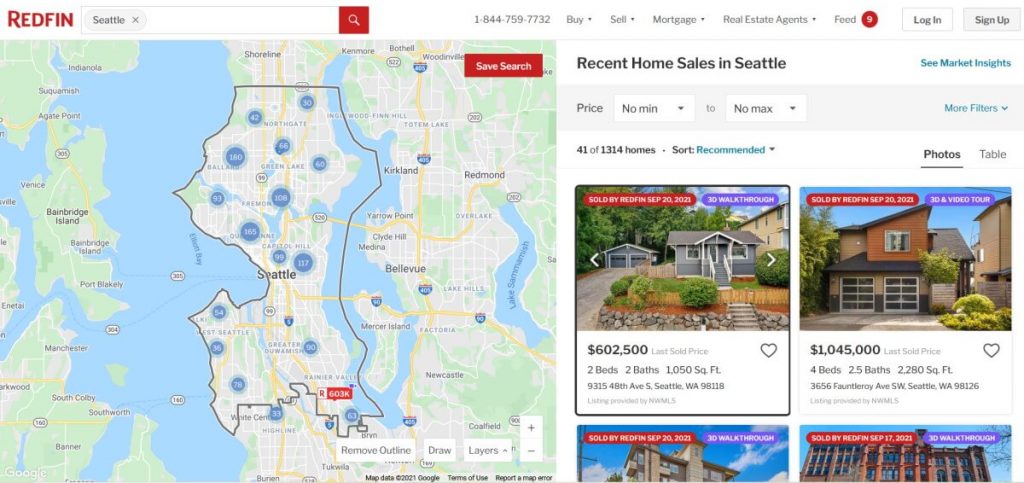
Redfin is another popular alternative to Zillow that is good for pulling comps. Redfin is essentially an online brokerage that helps buyers and sellers facilitate real estate transactions using their own agents instead of a traditional brokerage. They also have an online sales database that is free to use, even for those not utilizing their brokerage service. Because they have experienced agents working toward updating the sales data, their figures are often more accurate than Zillow and Trulia and they offer more in-depth sales metrics, as well.
7. Realtor.com
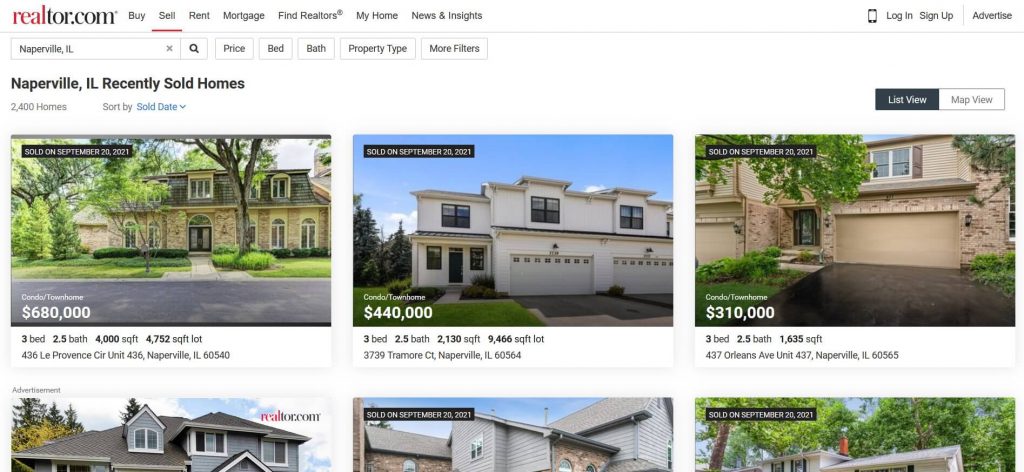
Realtor.com is another useful resource for finding the value of properties in the area. It’s a resource sponsored by the National Association of Realtors and offers free data on properties across the country. Their online database can help you view key metrics about a property, such as the square footage, lot size, and its estimated value vs the average sale price in the neighborhood. Plus, it can help connect you with an experienced broker in the area if you want to do a deeper dive into the numbers using the MLS.
8. Property Shark
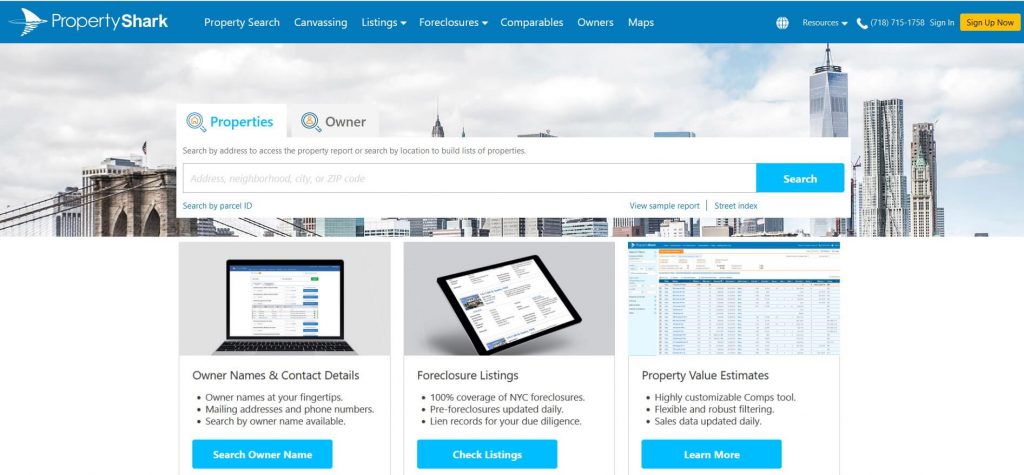
Property shark is an online data aggregation platform that offers valuable resources to property investors. In addition to searching for listings and pulling sales data, the software also has a handy tool that allows you to find the contact details of the current owner. But it only offers limited features with the free version and to get the most out of this powerful software, you’ll have to sign up for a paid monthly plan.
Other Ways To Find Comps
A) Speak To Real Estate Agents
An investor friendly real estate agent can be a very helpful resource when attempting to get house comps. Licensed real estate agents tend to have very good knowledge of how much homes are worth, especially in the local market they specialize in.
Also, there’s no reason to feel guilty about sourcing house price info from a real estate agent, even if you don’t intend to use their services. It’s better to think of it as a networking opportunity. The more real estate agents you have on speed dial, the easier it will be for you to buy and sell properties when you are ready to pull the trigger on a deal.
B) Pull MLS Comps
The simple truth is that only licensed real estate professionals can pull MLS comps. However, that doesn’t mean that someone can’t source MLS comps on your behalf.
Real estate agents, realtors, appraiser are your best bet for sourcing MLS Comps. However, you can also consider using a syndication service like ListHub.
Why Are Real Estate Comparables Crucial For Investors?
One of the most important components of being a successful real estate investor is the ability to identify the potential value of a property. But you can’t hire an official appraiser every time you come across a potential deal. The easiest way to quickly estimate the potential market value of a property is by pulling comps from similar nearby properties.
Understanding and leveraging real estate comparables (comps) is crucial for investors for several reasons:
Accurate Valuation: Comps provide a realistic snapshot of a property’s value in the current market, ensuring that investors can assess whether they are getting a fair deal.
Informed Buying and Selling: They help buyers avoid overpaying and assist sellers in setting a competitive yet profitable price, which is vital in a dynamic market.
Appraisal Precision: Comps play a significant role in the appraisal process, reducing the risk of under or overvaluation. This accuracy is essential for securing financing and closing deals smoothly.
Investment Viability: For investors, comps are indispensable in analyzing the potential return on investment. They offer insights into market trends and help forecast the financial success of a property acquisition.
Incorporating real estate comps into your investment strategy improves your ability to make informed decisions and identify properties with the most potential for delivering a positive return on investment.
Final Thoughts
Real estate investing is all about crunching the numbers and using data to make smarter decisions. Compiling accurate comps is one of the best ways to ensure that you budget correctly and you’re able to get your desired return from a deal. Any of the software listed can help you compile accurate comps and you may even want to use multiple to ensure the figures are as accurate as possible.
Frequently Asked Questions
Determining property comparisons, or “comps,” isn’t an exact science. In fact, it blends art and analytical skill. Automated software tools, like those using desktop appraisals, often attempt to streamline this process. While they offer quick assessments, their accuracy isn’t flawless. Here are some key considerations when using comps software:
Human vs. Algorithmic Analysis: Unlike human appraisers who can account for interior details and subtle differences, software mainly relies on exterior factors. This can result in less nuanced evaluations.
Diverse Neighborhood Challenges: In areas with varying architectural styles, such as a mix of ranch and two-story homes, these tools can fall short. They might miscalculate by comparing unlike properties, leading to inaccuracies.
Effectiveness in Uniform Areas: Automated tools tend to perform better in uniform environments, like cookie-cutter suburbs or condominiums. Here, they can accurately average nearby sales figures, aligning well with the neighborhood’s consistent pricing.
Potential Margin of Error: In diverse settings, inaccuracies can significantly impact financial outcomes. For instance, even a small misjudgment could consume a real estate investor’s expected profit margin.
While automated tools can offer baseline insights, it’s crucial to supplement them with expert opinions for precise property valuation. Balancing technology with human expertise tends to yield the most reliable results.
Comp software algorithms are powerful tools in real estate, but they do have limitations, especially in diverse neighborhoods. Here are some factors they might not fully account for:
1. Functional Obsolescence
This refers to features that decrease a property’s desirability, such as outdated layouts or inefficient systems. While the software focuses on sales data averages, these unique characteristics might not be reflected accurately.
2. Street Characteristics
The location specifics, like whether a property is on a busy or quiet street, or even which side of the street it occupies, can significantly impact its value. Algorithms often overlook such nuances.
3. Condition of the Property
Whether a property is newly renovated and stunning or in need of major repairs can greatly influence its market value. Comp software may miss these subtleties, especially if it primarily relies on nearby sales data without context for condition.
4. Neighborhood Diversity
In areas with a diverse range of homes, from high-end to fixer-uppers, averages can be misleading. Software might perform well with uniform neighborhoods, such as tract homes or condos, but could struggle to accurately assess areas with more variety.
Understanding these limitations highlights the importance of coupling algorithmic insights with human expertise when evaluating property values. This balanced approach ensures a more comprehensive assessment, especially in areas where variability is significant.
If you are considering advanced, premium comps software, it’ always a good idea to look for these key features:
Historical Data Access: Look for software that provides access to previous listings, including photos and descriptions. This allows you to understand market trends and see how properties have evolved over time.
Expired Listings: Identifying homes that didn’t sell can provide insight into pricing strategies and market demand, helping you make more informed decisions.
Valuation Insights: Advanced tools often offer features like automated valuation models (AVMs) to give you an estimated value of properties based on various metrics.
Neighborhood Analysis: Consider software that provides detailed demographic and geographic data to better understand the local market and factors impacting property values.
Customizable Reports: The ability to generate and customize reports can save time and help effectively communicate your findings to clients or stakeholders.
These added features can offer significant value, complementing your growing expertise and providing deeper insights into the real estate market.
Using a real estate comparables tool can be a game-changer when you’re trying to determine the value of a property. Here’s how you can make the most of these tools.
Get Started
Access the Tool: Start by logging into your chosen real estate platform. Websites like Zillow, Redfin, and Realtor.com offer robust comparables tools.
Input the Property Address: Enter the address of the property you’re interested in. This helps to tailor the search to your specific needs.
Analyze Property Details
- Explore Property Insights: Navigate to the page that provides detailed information about the property. Here, you’ll find vital statistics like square footage, number of bedrooms, and any unique features.
Compare with Similar Properties
Identify Comparable Sales: Look for a section dedicated to comparable properties or “comps.” This will show properties that have sold recently in the same area and share similar characteristics.
Apply Filters for Precision: Fine-tune your comparison by filtering comps based on criteria like:
- Distance from Property: Ensure you’re comparing properties within a close radius.
- Sale Date: Focus on recent sales for the most accurate market conditions.
- Property Type: Match the type (e.g., single-family, condominium) to get relevant insights.
Dive Deeper
- Examine Detailed Data: The tool will provide detailed statistics for each comparable property, such as sale price, date, and current market trends. Use this to glean insights and identify any anomalies or trends.
Estimate Property Value
- Evaluate and Conclude: With all the data in hand, analyze the compiled information to estimate the property’s value accurately. This will guide your decision-making, whether you’re buying, selling, or investing.
By following these steps and utilizing the features offered by online real estate platforms, you can effectively leverage comparables tools to make informed property decisions. Remember, the key is in the details—filter carefully and analyze comprehensively for the best results.



